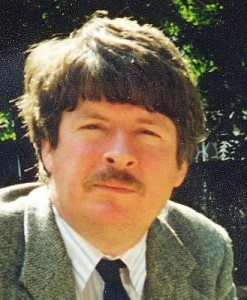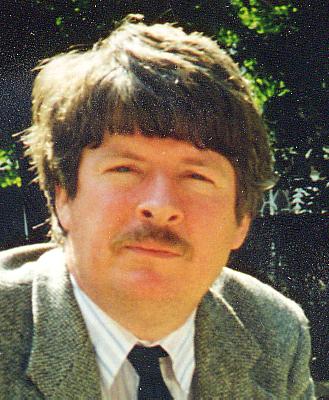From “Rye’s Own” April 2001 issue.
Councillor Alan Dickinson was first elected to Rye Town Council in
1991. A local boy who attended the Thomas Peacocke he works in his
own right as a building surveyor.

He is currently on the council’s Leisure & Tourism and Safety and
Relief in Need committees and is passionately interested in the conservation
and promotion of the town’s heritage. He was founder Chairman of Rye
Local History Group. His book ‘Around Rye in Old Photographs’ has
been widely acclaimed and will shortly be followed by a sequel ‘Rye
& Winchelsea in Old Photographs’.
Alan moved into Rye from Playden when he married Jean, a Kent girl,
in 1987. They have five children and live in The Grove where the following
interview with Jim Hollands took place on Tuesday 13 March.
Jim Hollands. The dominant subject over the past few months has been
the state of policing in Rye. How do you see the situation?
Councillor Dickinson. I share residents and traders concerns over
crime and police response. There should be 24 hour police foot patrols
and the police station should again be kept open around the clock.
There can be no compromise on this. C.C.T.V. cameras may be some deterrence
but I suspect it will just move crime into areas that are not covered
by the cameras. There is no substitute for policemen on the ground.
J.H. Where do you stand on a by-pass for Rye? A.D. I think that
it would be unfair if Rye’s unique environment were to restrict its
economy by preventing any form of road improvement particularly if
the Hastings Bypass goes ahead leaving Rye as a bottleneck. The suggestion
by some of the anti by-pass groups that Rye will lose all its trade
if a by-pass is built is proved wrong by many other ancient holiday
towns. Arundel is one that immediately springs to mind. The road passes
within sight of the Castle which attracts like a magnet. If Rye’s
By-Pass runs south of the town it will give magnificent views of Rye’s
unique silhouette which will draw visitors in the same way. I would
be in favour of such a route as long as the road goes under the river.
A bridge over might jeopardise the Rother’s status as a tidal river
and Rye’s function as a Port.
J.H. On the subject of the towns silhouette I believe you are representing
the Town Council in a new scheme, using money raised by the Rye Partnership
with Intereg funding, to illuminate the Landgate Tower and Ypres Castle.
A.D. Yes, I am helping to prepare a system of subtle lighting that
will softly illuminate and enhance the two buildings by night. Some
of the effects may be gained by lights situated behind the arrow slits
and windows.
J.H. Have you fulfilled many of your aims and attained some of your
objectives in your ten years as a Rye Councillor?
A.D. I was first elected on the basis of wide ranging objectives
in relation to employment, housing, environment and conservation.
I feel that I have contributed towards the promotion of these objectives,
often behind the scenes in the early stages of council initiatives,
including some planning matters and improvements to the council’s
own buildings.
J.H. What are your views on the proposal that the Rye Council should
make an offer of purchase to the County Council for the Ferry Road
School site and use it for the benefit of the people of Rye using
money that could be raised by the Partnership for the many projects
that could be accommodated on this very large piece of ground?
A.D. I support all initiatives to improve Rye’s environment and improve
sport and recreational facilities for all ages. This site could be
a great asset to the town and I am very much in favour of exploring
community and employment uses. I regret the County Council’s premature
demolition of the buildings before conversion possibilities had been
discussed. For example, as a relocated Public Library.
J.H. What is your view on a Town Manager for Rye?
A.D. I am in favour of investigating the possibility. Particularly
to provide expertise and co-ordination for the various funding applications
with which local organisations struggle in isolation.
J.H. What would be your criteria for the position?
A.D. The manager would ideally be directly answerable to Rye Council.
It would be nice if a local person with the right qualifications could
be found for the job. Practical experience in dealing with public
authorities will be needed.
J.H. Throughout your time in office it is noticeable that you have
been a champion of openness and co-operation in local government.
You were a joint promoter of the Town Council Newsletter which appeared
up to the end of 1999 in ‘Fixtures’. You were also closely involved
with the improvements to the Town Hall offices. What are you looking
to improve during 2001?
A.D. The large stones that fill the borders of the Railway car park
have worried me. They have been used as ammunition by youngsters on
several occasions. I am hoping that we can exert pressure on the railway
to fill these borders with cement and make them safe. This is a concern
of local residents which I have brought to the Safety committee, a
group I have found to be a valuable forum for liaison with other bodies
in the town and the police.
I should also like to see improvements on the fringes of the walkway
from Tillingham Avenue to Mill’s Farm. This is such a pleasant area
of the town, it deserves to be tidied up.
J.H. As a Ryer, what are your overall aims in your work as a councillor?
A.D. I support all efforts to improve Rye’s environment and secure
a balance between tourism and other employment opportunities. I am
very interested in the conservation and promotion of the town’s heritage.
